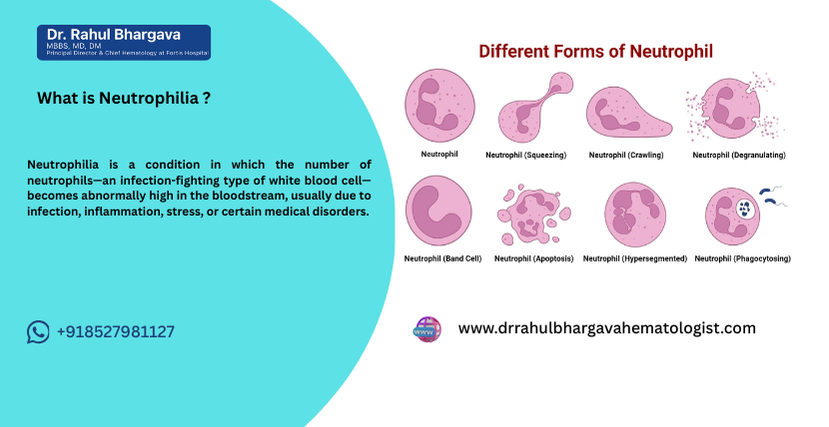Neutrophilia Treatment in India

Neutrophilia refers to an increased number of neutrophils in the blood. Neutrophils are a type of white blood cell that play a crucial role in the immune system’s defense against infections, particularly bacterial infections. Neutrophilia is often a sign of an acute or chronic infection, but it can also be caused by a variety of other conditions, including inflammatory diseases, stress responses, and certain cancers.
A normal neutrophil count in the blood typically ranges from 1,500 to 8,000 neutrophils per microliter. When the count exceeds this range, it is considered neutrophilia, and the degree of increase can be classified as mild, moderate, or severe.
What is Neutrophilia?
Neutrophilia is a condition characterized by an increased number of neutrophils in the blood, a type of white blood cell responsible for fighting infections. While it can be a natural response to infection or inflammation, it may also indicate more serious underlying conditions, including bone marrow disorders. Understanding neutrophilia is crucial for identifying and effectively treating the root cause.
Causes of Neutrophilia
There are several potential causes of neutrophilia, ranging from common to more serious conditions. These include:
- Infections: Bacterial, viral, or fungal infections.
- Inflammation: Conditions like rheumatoid arthritis or inflammatory bowel disease.
- Stress and Exercise: Physical or emotional stress can cause a temporary rise in neutrophils.
- Medications: Corticosteroids, lithium, or epinephrine can increase neutrophil counts.
- Bone Marrow Disorders: Such as leukemia or myeloproliferative disorders.
- Smoking: Smoking can lead to a chronic increase in neutrophil levels.
Identifying the cause is critical for proper treatment.
Types of Neutrophilia
Neutrophilia can be classified into different types based on its severity and cause:
- Mild Neutrophilia: A slight increase, often due to infections or inflammation.
- Severe Neutrophilia: Associated with conditions like leukemia or bone marrow disorders.
- Chronic Neutrophilia: Continuous elevation over time, often related to chronic diseases or long-term medication use.
Symptoms of Neutrophilia
In many cases, neutrophilia may not present clear symptoms, as it is often detected during routine blood tests. However, the symptoms may align with the underlying cause:
- Fever or signs of infection
- Fatigue or unexplained tiredness
- Swelling or pain in areas of infection or inflammation
- Night sweats
- Unexplained weight loss
- Frequent infections or slow healing wounds
These symptoms indicate the need for medical evaluation to determine the cause of elevated neutrophils.
Diagnosis of Neutrophilia
Diagnosing neutrophilia typically begins with a Complete Blood Count (CBC) test, which measures the levels of different blood cells. If elevated neutrophils are detected, further tests may be required, such as:
- Blood Smear: To examine the appearance of neutrophils.
- Bone Marrow Biopsy: To assess bone marrow function in cases where a bone marrow disorder is suspected.
- Infection Testing: Blood cultures or other tests to detect the presence of infections.
- Genetic Tests: To rule out or confirm conditions like chronic myelogenous leukemia (CML).
Early and accurate diagnosis is key to managing neutrophilia effectively.
Treatment of Neutrophilia
Treatment for neutrophilia depends on the underlying cause:
- Infection-Related Neutrophilia: Antibiotics or antiviral medications may be prescribed to treat infections.
- Inflammatory Conditions: Anti-inflammatory drugs or immune-modulating therapies are used to reduce inflammation.
- Bone Marrow Disorders: Chemotherapy, targeted therapies, or bone marrow transplants might be necessary for conditions like leukemia.
- Lifestyle Changes: For cases related to stress, smoking, or exercise, lifestyle modifications can help normalize neutrophil levels.
Dr. Rahul Bhargava specializes in personalized treatment plans based on each patient’s unique condition and medical history.
Cost of Treatment and Stay in India
The cost of treating neutrophilia in India can vary depending on the underlying cause, type of treatment required, and the healthcare facility. India offers high-quality healthcare at a fraction of the cost compared to many Western countries, making it an ideal destination for medical treatment. Below is an overview of the costs associated with treating neutrophilia and its underlying causes:
-
Initial Consultation:
USD: $20 – $80
INR: ₹1,500 – ₹6,000 -
Blood Tests (CBC, Blood Smear, Infection Testing):
USD: $30 – $100
INR: ₹2,200 – ₹7,400 -
Medications for Infection or Inflammation:
USD: $10 – $200
INR: ₹750 – ₹15,000 -
Bone Marrow Biopsy:
USD: $200 – $1,000
INR: ₹15,000 – ₹75,000 -
Hospital Stay (if required):
USD: $50 – $150 per night
INR: ₹3,700 – ₹11,100 per night
India’s healthcare system provides affordable treatment options for neutropenia, with costs considerably lower than in many Western countries. The treatment approach is tailored to the specific cause, ensuring the most effective care while maintaining a cost-effective solution for patients.Quick L
Frequently Asked Questions
A normal neutrophil count ranges from 2,500 to 7,000 neutrophils per microliter of blood. Anything above this may indicate neutrophilia.
Neutrophilia itself is not usually harmful, but it could be a sign of an underlying health condition that needs to be addressed.
Yes, physical or emotional stress can temporarily increase neutrophil levels, but they usually return to normal once the stress subsides.